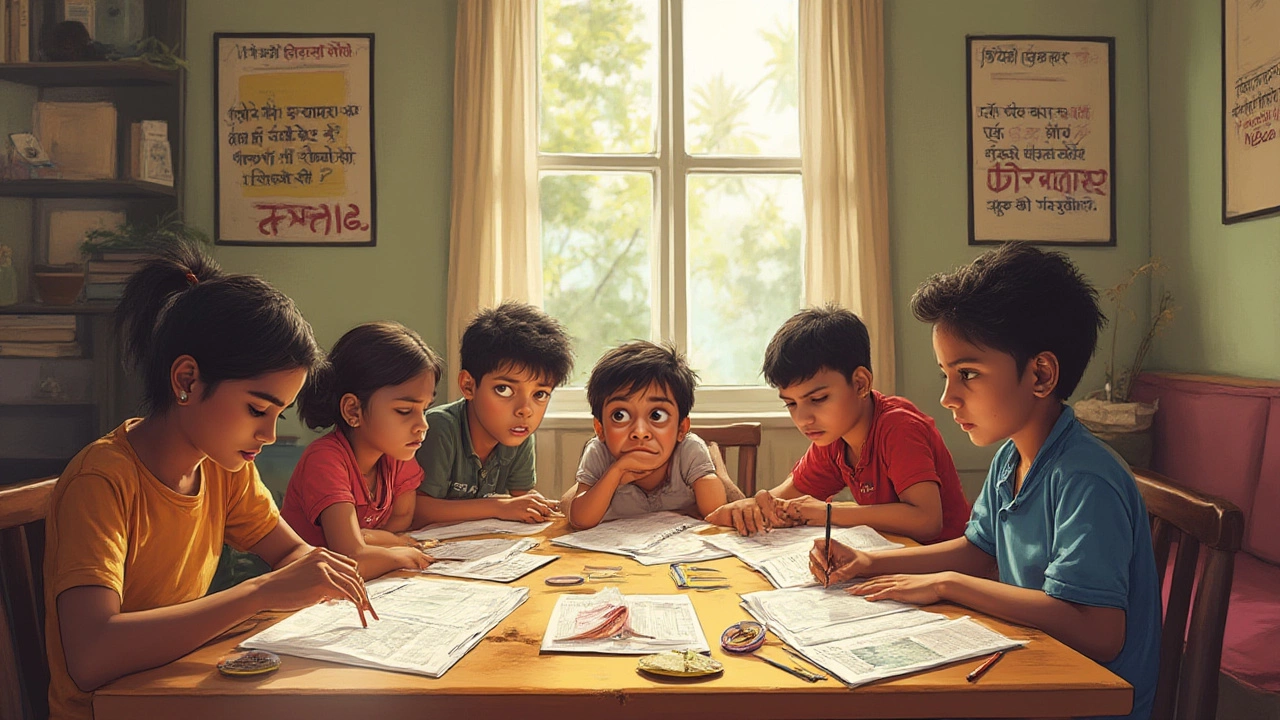Picture this: a group of students hunched over desks, sheets of loose paper scattered, coffee cups clinking—each person muttering about the "toughest" subject they've ever faced in CBSE. Science? Maths? English? Their answers are rarely the same, but the anxiety in the air is almost identical. If you've ever been caught in the great CBSE debate over which subject is truly the hardest, you're not alone. The spark for endless arguments—it takes only one lunch break to set off the classic "Is Physics really scarier than Maths?" showdown.
But here's the twist—there's no single answer. The "hardest" CBSE subject often comes down to who you are, your interests, your teachers, and even the tactics you use to study. Still, some patterns do emerge. Dig in with me as we dig through those endless lists of chapters and endless exam schedules, bust some myths, and get a grip on what really makes a CBSE subject tough, which ones actually top the charts for most students in 2025, and how you can outsmart the system (without pulling your hair out in the process).
What Makes a CBSE Subject Tough? The Real Factors
The word "tough" rarely means the same thing to two different people. For one, it’s lack of sleep before the Maths paper. For another, it’s Biology diagrams that never look right. But there are a few real-world factors that almost everyone agrees can make a CBSE subject feel like a mountain to climb:
- Depth and Breadth of Syllabus: CBSE loves a detailed syllabus. You’ll find some subjects—think Chemistry or History—with chapters that seem endless, filled with concepts, formulas, or names you’re expected to memorize or understand on a deep level. Such content-heavy subjects naturally feel overwhelming, especially as you move up to Classes 11 and 12.
- Abstract Concepts: Physics is infamous for this. It’s not just about mugging up facts—it’s about truly understanding abstract ideas, visualizing things you can’t always see or touch, like electromagnetic fields or the laws of thermodynamics. No wonder this subject freaks out so many!
- Problem-Solving Speed: Maths and Physics both bring in the clock. You might understand the method, but finishing those word problems in the time given? That’s another level of pressure. The speed needed to sail through these papers is a real test.
- Language Barriers and Interpretation: English might not seem like a "tough" subject until you sit down to write those analytical answers, essays, or decode literature. Having to interpret poetry or dissect meanings under time crunch can turn English into a monster of its own.
- Practical vs. Theoretical Balance: Subjects like Biology or Computer Science throw in a curveball—practicals. Not only do you have to cram theory, but you also need to ace experiments and coding under watchful eyes, which can seriously ramp up anxiety.
But let's face it, a huge factor is also how the subject's teacher explains things. A good teacher can make even Organic Chemistry feel like a magical story; a bad one can turn even Hindi into torture. There’s also social pressure—parents, tuition centers, and Instagram "toppers" all yelling about their own toughest challenge, which adds extra stress for everyone else.
Let’s look at how all these combine with documented difficulty—see what regular students, exam data, and even teachers say, not just hearsay from your cousin’s friend’s neighbor. Here’s a little data snapshot:
| Subject | Average Pass Rate (2024) | Common Difficulty Mentioned |
|---|---|---|
| Mathematics | 91% | Conceptual problems, fast calculations |
| Physics | 88% | Abstract concepts, numerical application |
| Chemistry | 93% | Memorization, application of theory |
| Biology | 95% | Diagrams, heavy theory |
| English Core | 96% | Interpretation, writing skills |
| History | 94% | Date memorization, essay writing |
| Economics | 92% | Graphical analysis, theory |
Notice how Physics sneaks in with a lower average pass rate? That hints at what many students actually feel. Of course, your own "hardest" might not match the stats. It’s personal—and that’s okay.

The Top Contenders: Most Feared CBSE Subjects Unpacked
So, let’s get real—when teens late-night chat or parents gather around at meetings, a few subjects always dominate the "toughest CBSE subject" title race. Here’s what you’ll usually hear, and why:
- Mathematics: Year after year, Maths scares a fair number of students. CBSE’s Mathematics in Classes 10 and 12 is no joke—the pressure isn’t just on memorizing formulas, but actually knowing when and how to use them. Those infamous HOTS (Higher Order Thinking Skills) questions can trigger panic. It all depends on your problem-solving muscle.
- Physics: This is the real plot twist for many who thought they liked science. Physics asks for more than rote learning; it demands clarity in logic, mathematical equations, and the guts to face tricky numericals. Electrostatics or optics chapters leave so many students lost that entire YouTube channels have built brands around "making Physics easy."
- Chemistry: Notoriously, Organic Chemistry is dreaded more than Inorganic or Physical. Branching reactions, mechanisms, exceptions to rules—there’s a reason some kids dream of benzene rings after a week of study! One study in late 2024 found that over 30% of students listed Organic Chemistry as their single most challenging topic before their board exams.
- Biology: Seemingly easy with its theory, Biology's mountain of terms, diagrams, and processes takes dedication (and color pens, if you ask me). The volume can make studying for boards feel like prepping for an encyclopaedia signing contest. For non-memorization types, it’s a headache.
- Economics and Accountancy: Let’s be real, the "Commerce" subjects don’t get off easy either. These subjects ask for application-based understanding, statistical analysis, and heaps of graphs—especially as you hit Classes 11 and 12. Many struggle to keep pace with conceptual clarity and number crunching. Plus, the new changes in CBSE’s Economics syllabus in 2025 have added to the workload, as reported by several Delhi and Mumbai schools this spring.
- English Core: Just because it’s in the "language" category doesn’t mean a walk in the park. The shift from grammar drills in earlier classes to essays, unseen passages, and literary interpretations can leave even fluent speakers stumped. It’s art plus logic, all rolled into one.
Let’s zoom in on why you—yes, you reading this—might think a subject is hard. Personality matters. Some of my friends adore Physics’ puzzle-like quality; I, on the other hand, prefer Chemistry’s neat equations. My spouse Nolan is a numbers whiz but couldn’t remember a poem to save his life. Your strengths and learning style play a huge part here, so don’t be swayed by the crowd.
What about non-mainstream subjects? Psychology, Fashion Studies, or even Fine Arts have their own "hidden traps"—like extensive portfolios, detailed case studies, or hours of practice not always reflected in the written exam. No subject is "easy" for everyone, but difficulty usually points to how the subject is taught, how the exams are set, and the support you have around you.
CBSE Board trends also keep shifting. The focus on application-based questions post-2020 has made rote tricks less useful and forced everyone to actually "get" the concept. Several teachers in leading Bengaluru schools noted that students who relied on old "guesswork" methods for Physics have scored lower as question patterns now favor understanding over repetition.

How to Survive (and Master) the Hardest CBSE Subjects
Feeling the dread yet? Don’t worry, every tough subject has a few classic pain points—but also some well-tested tricks to take the sting out. Here’s what works when things start to feel impossible:
- Break Down the Syllabus: Giant syllabi make everything seem impossible. Slice it. If Physics (the most feared according to pass rates) freaks you out, separate the theory, numericals, and practicals. Conquer one bit each week instead of panicking over the whole mountain.
- Don’t Just Memorize—Understand: In subjects like Chemistry and Physics, try to "see" what’s actually happening. Use real-life stories—when I was learning kinetic energy, I imagined myself racing with Nolan up the stairs (trust me, it’s hard to forget!).
- Write it Out, Draw it Up: Biology and History love visual learners. Draw diagrams, make mind maps. Use colors for different eras, biological processes, or organic reactions. There’s a reason every CBSE topper from 2024 recommended this trick—it makes revising 10x faster.
- Practice Previous Year Papers: There is no substitute. You’ll get used to the types of questions, learn to manage timing, and lower your anxiety around unfamiliar formats. This is especially true for Maths and Economics, where patterns sometimes repeat.
- Group Study: Not everyone likes a crowd, but occasional group sessions let you see how others solve a problem or memorize a tough process. It helps break mental blocks and you might just find someone else’s method fits you better than your own!
- Ask for Help (and Don’t Feel Bad About It): Teachers want to help—even if they sometimes seem scary. Most 2024-2025 CBSE high scorers credited frequent doubt sessions and asking "dumb" questions early on for their marks. Sometimes you just need the right explanation, not more study hours.
- Online Resources and Coaching: Beyond tuition classes, there’s a goldmine of online content in 2025. CBSE-specific YouTube channels, mobile apps, and free sample tests can breathe new life into stale chapters. But choose wisely—rely on resources rated highly by other CBSE students, not just flashy ads.
- Stay Consistent, Not Obsessive: Guilt from skipping a topic once is useless. Regular, short study sessions win over one-night mugging. Build a simple routine and stick to it. I tell my friends to treat it like caring for a plant—water a little, often, don’t drown it all at once.
Feeling burnt out? Take breaks that recharge (a quick walk, silly reels, or chats with friends). Mental health counts as much as syllabus coverage. A CBSE survey in 2024 found that students who took 10-minute breaks for every hour of study did better on average than those who tried marathon sessions. It’s not just about "studying more," but about "learning smarter."
For something really concrete, here’s a table inspired by tricks shared by high scorers in Delhi schools during the March 2025 board batch:
| Subject | Top Scorer’s Hack |
|---|---|
| Mathematics | Daily 2-3 past year question sets, timed attempts |
| Physics | Teaching a concept to a friend or in front of a mirror |
| Chemistry | Flashcards for organic reactions and quick quizzes |
| Biology | Sticky notes on walls for diagram revision |
| English Core | Reading editorials and practicing summaries weekly |
| Economics | Drawing graphs out by hand daily, not just looking at them |
So, if you’ve been losing sleep over the notorious "toughest CBSE subject," you can finally breathe a little easier. Your speed, memory, and understanding all have a role—but the right mix of practical hacks and a positive mindset flips the game in your favor. You might not learn to love Calculus or organic reagents overnight, but you can absolutely make the "impossible" feel manageable. If I could survive the brutal Chapter 7 of Class 12 Chemistry, you’ve got this too.





